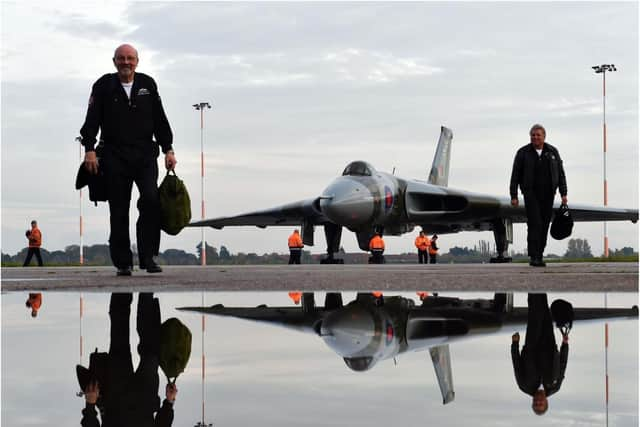Doncaster Vulcan veterans remember 40th anniversary of Falklands bombing raids
and live on Freeview channel 276
Veterans from the 1982 conflict with Argentina gathered to remember the special mission which saw the RAF launch a series of long-distance raid on Port Stanley airport by Vulcan bombers.
Operation Black Buck was so complicated that 11 tanker planes were needed for refuelling, and it was all put together in two weeks with an aircraft due for retirement.
Advertisement
Hide AdAdvertisement
Hide AdPilot Martin Withers said it was the first such raid he had ever done.


"I'd only ever seen World War Two movies," the retired squadron leader said.
"I'd never done any bombing like this before or been fired at."
The overnight attack which began on 30 April 1982 was the first of seven raids on the airfield which had been held by Argentine forces after their invasion on 2 April.
Advertisement
Hide AdAdvertisement
Hide AdThe bomber crew had to fly 3,700 miles (6,900 km) from RAF Waddington near Lincoln to Ascension Island in the South Atlantic and then another 3,300 miles (6,100 km) to the Falkland Islands.
Mr Withers, who was also responsible for piloting Doncaster Sheffield Airport’s last remaining Vulcan XH558 before its retirement from the skies, said the crew did not know if the raid had been successful after releasing the bombs.
"We weren't very confident that we had hit the target but we knew we had done a good attack and we were safe and on our way home," he said.
"It wasn't more than 24 hours later that we actually got a film that showed that we had put one big crater in the runway."
Advertisement
Hide AdAdvertisement
Hide AdThe islands were recaptured when Argentine forces surrendered on 14 June.
The Vulcan bomber that carried out the first raid is undergoing restoration at RAF Waddington.
Following several weeks of fighting on land, sea and in the air, Argentina surrended on June 14, 1982. The war saw 255 British casualties, 649 Argentine deaths and three civilian Falkland Islander deaths.
While the XH558 housed at Doncaster Sheffield Airport was not involved in the raids on Port Stanley Airport, crew involved in its upkeep and flying the aircraft until it was eventually grounded are based in the town as part of the Vulcan To The Sky Trust.
Advertisement
Hide AdAdvertisement
Hide AdThree Doncaster men were among those killed in the conflict, which lasted more than two months.
Hatfield-born Capt Ian North, 57, skipper of Merchant Navy cargo ship Atlantic Conveyor died on May 25, 1982 after the ship was hit by two Exocet missiles while Edlington Para Private Stephen Illingsworth was just 20 years old when he was shot by an Argentine sniper during the recapture of Goose Green on May 28.
Leading Cook Tony Sillence, 26, of Wheatley Hills, died on June 12, just a few days before the Argentine surrender on June 14 when his ship, HMS Glamorgan was hit by an Exocet missile fired from the shore.
Memorials to all three men exist in both Doncaster and the Falkand Islands.